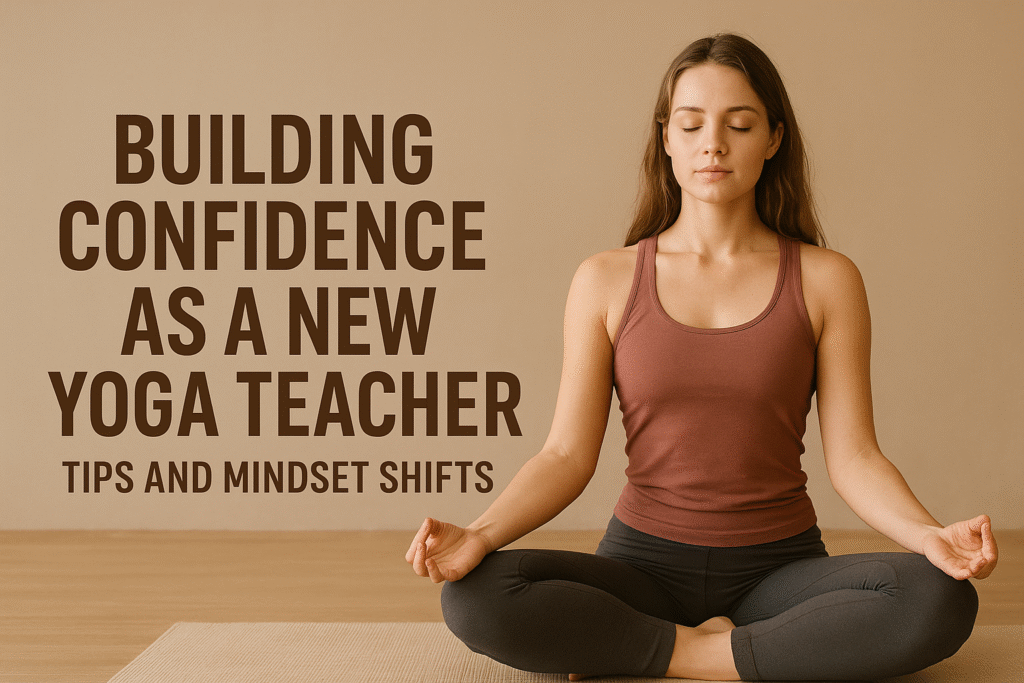Embarking on your journey as a yoga teacher is both exciting and transformative. But for many newly certified yoga instructors, the first few classes can feel intimidating — filled with self-doubt, performance anxiety, and the fear of not being “good enough.”
The truth is, confidence as a yoga teacher doesn’t come overnight. It’s cultivated through experience, self-awareness, and continuous growth — both on and off the mat. At Nada Yoga School in Rishikesh, we guide aspiring teachers to not only master the technical aspects of teaching but also to embody the mindset of authenticity and confidence.
In this blog, let’s explore practical tips and mindset shifts that can help you build lasting confidence as a new yoga teacher.
1. Understand That Confidence Comes with Experience
Many new teachers think they must feel fully confident before they start teaching. The reality is the opposite — confidence grows through teaching.
Every class you teach, every student interaction, and every adjustment you make becomes part of your growth as a teacher.
Try this approach:
- Accept that nervousness is normal — even experienced teachers feel it.
- Start with smaller classes or teach friends and peers first.
- Reflect after each class on what went well and what you can improve.
Remember, your students are not expecting perfection; they’re looking for presence, guidance, and genuine energy.
2. Keep Practicing Your Own Yoga
A confident yoga teacher is always a dedicated yoga student. Continuing your personal practice keeps you grounded, inspired, and connected to your purpose.
Benefits of maintaining your practice:
- It deepens your understanding of asanas and alignment.
- You stay authentic — teaching from personal experience.
- It strengthens your connection between body, mind, and breath.
At Nada Yoga School in Rishikesh, we remind our trainees that teaching yoga should come from a place of experience, not memorization. When you teach from your own journey, your authenticity naturally builds confidence.
3. Prepare, But Don’t Overplan
While preparation is important, overplanning can lead to rigidity and stress. Aim for structured spontaneity — know your sequence, but stay open to your students’ energy.
Here’s how to balance it:
- Write down a few key themes or peak poses.
- Have a plan, but adapt it if your class needs something different.
- Keep cue cards or short notes until you’re fully comfortable.
Trust your intuition. The more you teach, the easier it becomes to read your class and guide them mindfully.
4. Cultivate a Growth Mindset
Confidence is deeply connected to mindset. A growth mindset — the belief that you can improve with effort and learning — helps you stay resilient through challenges.
Instead of thinking, “I’m not a good teacher yet,” shift to:
“I’m becoming a better teacher every day through practice and reflection.”
Ways to build a growth mindset:
- View mistakes as lessons, not failures.
- Keep learning through workshops and continuing education.
- Surround yourself with a supportive yoga community.
The journey of teaching yoga is lifelong. Embrace growth over perfection.
5. Develop Your Own Teaching Voice
As a new yoga teacher, it’s natural to imitate your mentors or follow your school’s teaching style. But over time, confidence blossoms when you find your unique teaching voice.
Ask yourself:
- What kind of teacher do I want to be — gentle, empowering, spiritual, technical?
- What kind of energy do I want to create in my classes?
- What inspires me the most about yoga?
Tips to find your authentic voice:
- Incorporate stories, themes, or philosophy that resonate with you.
- Speak naturally — you don’t need to sound like anyone else.
- Teach what you truly practice and believe in.
Authenticity creates connection, and connection builds confidence.
6. Focus on Your Students, Not Yourself
A major confidence shift happens when you move the focus from self-consciousness to service.
When you stop worrying about how you look or sound, and instead focus on your students’ experience, your teaching becomes more fluid and intuitive.
Practice this mindset shift:
- Before class, take a few deep breaths and set an intention to serve.
- Observe your students’ energy, breath, and expressions.
- Offer guidance from compassion, not performance.
Your students will feel your presence, and you’ll naturally feel more confident and connected.
7. Keep Learning and Growing as a Teacher
Confidence thrives on competence. The more you learn, the more tools you have to serve your students effectively.
Consider continuous learning paths like:
- Advanced Yoga Teacher Training (300 Hour YTTC)
- Specialized workshops in pranayama, anatomy, or sound healing
- Retreats and immersions for self-growth and renewal
At Nada Yoga School in Rishikesh, we encourage our graduates to continue exploring — whether through advanced courses or deepening their meditation and philosophy studies. Every new learning adds a layer of confidence and wisdom.
8. Practice Mindfulness and Self-Compassion
New yoga teachers often struggle with self-doubt and comparison. Practicing mindfulness helps you stay centered in the present moment, while self-compassion reminds you to be kind to yourself.
Here’s how to practice both:
- Start each day with 5–10 minutes of meditation.
- Journal your thoughts after classes — what went well, what you learned.
- Speak to yourself as kindly as you would to your students.
Remember, you don’t have to be perfect to inspire others — you just need to be real and present.
9. Connect with a Community of Teachers
Being part of a supportive yoga community can dramatically boost your confidence. Sharing experiences with fellow teachers helps you realize that everyone goes through similar challenges.
Benefits of staying connected:
- You gain feedback and new teaching ideas.
- You feel supported and encouraged during difficult phases.
- You get inspired by others’ journeys and successes.
At Nada Yoga School, our alumni network allows teachers from across the world to stay connected, share experiences, and continue learning together — because growth never stops after certification.
10. Celebrate Your Progress
Lastly, confidence grows when you acknowledge your achievements — big or small.
Ways to celebrate your growth:
- Reflect on how far you’ve come since your first class.
- Appreciate the positive feedback from your students.
- Keep a teaching journal to track your evolution.
Yoga is a lifelong journey of self-discovery. Every time you step on the mat to guide others, you’re growing as both a teacher and a human being.
Final Thoughts
Building confidence as a new yoga teacher takes time, patience, and self-awareness. It’s not about being perfect — it’s about being authentic, compassionate, and committed to your path.
At Nada Yoga School in Rishikesh, we’ve witnessed hundreds of new teachers transform from nervous beginners into confident, inspiring guides. With consistent practice, a growth mindset, and the right community, you too can find your inner strength and teach from the heart.





